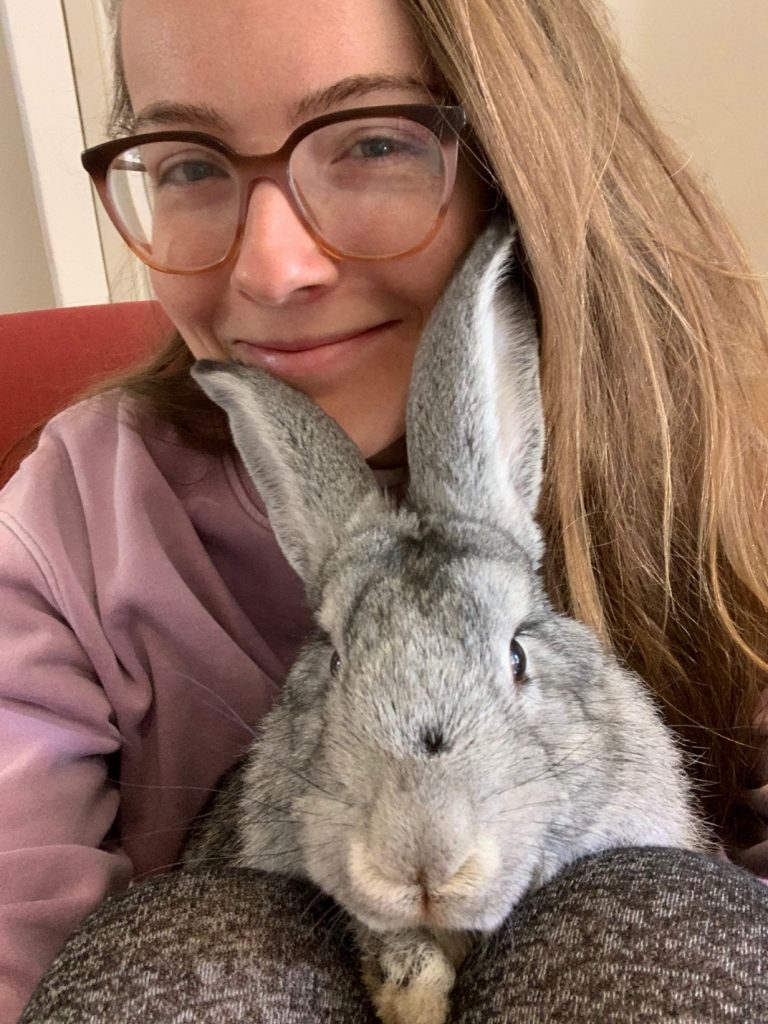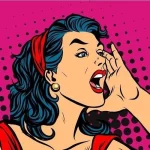
Fiona and a 4-month-old Sheldon, bought Lockdown 3.
A month ago, when I volunteered to write this article, I pledged to write it from a neutral point of view, using facts and nothing more. I wanted to write about how women on the spectrum often go undiagnosed for years and years. I wanted to write about the revolution happening within the medical community and the autistic community at large, now it is acknowledged that not every autistic person fits the curious-incident-of-the-dog-in-the-nighttime, predominantly male profile. Not every autistic person is hyper-organized (the peas can’t touch the mashed potatoes) and hypo-emotional (think Sheldon Cooper struggling with empathy). It’s called a spectrum for a reason.
In actual fact, I have only recently come to realize I myself am on the spectrum. I am a 27-year-old female creative; I have lived my whole life deeply experiencing my emotions, feeling there was something I couldn’t quite understand about how I related to others; and, somewhere in between watching Love On The Spectrum, all 622 episodes of The Big Bang Theory, and Atypical this lockdown, it clicked. I am, without a doubt, autistic.
Self-diagnosing is controversial: many people take umbrage, preferring a medical professional’s 3-8+ hour considered opinion. I have, throughout the past few years, flirted with the possibility I was autistic and was told by friends and family I was being silly. They knew people on the spectrum. I wasn’t anything like them. They usually followed it up by saying, “don’t worry.”
The thing is, I’m not worried. I am delighted. For the first time in my life, things make sense. For the first time, I have a functional frame with which to view myself in relation to a neurotypical-dominant world. I understand why certain relationships suffered, or why in drama school I struggled with things my classmates found easy; I understand my childhood and the tensions that arose in my family in a completely new way. I feel empowered.
I have listened to TedTalk after TedTalk where women realized they were on the spectrum after 20, 30, sometimes 40 years. I have listened to TedTalk after TedTalk where autistic men speak of being diagnosed as children. Many of these women were first diagnosed and medicated for different conditions, forced to reconcile prevailing medical wisdom with their own lived experiences (look up Carrie Beckwith-Fellows).[1] A friend I made in a neurodivergent writer’s group was diagnosed at 23 by Isabelle Henault, an expert in female-presenting autism and sexuality.[2] My friend is one of the lucky ones. I am one of the lucky ones. When my aunt was eventually diagnosed with autism, she was in her 50’s and had had an incredibly hard life.
I am scheduled for a medical diagnosis later this month, April 29th to be precise. Coming to terms with this during lockdown has been an absolute roller coaster, and one I will continue to ride (hopefully more smoothly) the rest of my life. (Also, for the record, I love roller coasters.) I have doubted myself for years, quieting the “could this be me?” to better fit how others saw me, masking so well I often fooled myself. It is only, ironically, with the space covid brought that I started to really let myself breathe.
Once I accepted this was me, I kept it quiet for a good few weeks, internalizing the opinion it is not appropriate to self-identify before a medical professional confirms. And then, I thought, Jody O’Neill didn’t know she was autistic until her son was diagnosed. Shona’s own Aoife Dunne was only diagnosed as a child because her male cousin had already been. 49.6% of the world is born female,[3] and yet the CDC reports 1 in 34 boys autistic, compared to 1 in 144 girls.[4] It’s not that only 0.7% of girls in the US are autistic; it’s that only 0.7% are diagnosed. A diagnosis is meant to reflect reality, not be the reality. Many autistic women will live their entire lives without having that privilege. But as Tashi Baiguerra reminds us, “I’ve been autistic my entire life, not just since my diagnosis.”[5]
I am proud to come out as an autistic woman. The medical diagnosis I am privileged enough to now access will give me more specifics, and more validation, but it is merely that. The 27 years of life I have lived, the research I have done [6], and the way I feel in my body and in the world, these things are what make me sure, beyond a reasonable doubt, that I am part of the spectrum. And I’m so happy to have finally realized it.
Thank you to all the brave autistic women that paved the way for me to be able to say this.
A little bit about Fiona: Fiona is a trained actor, yoga teacher, and postgrad fascia researcher at Trinity. She is passionate about empowering people to better understand and functionally use their bodies. Her areas of expertise include fascia, trauma, biotensegrity, neuroscience, and movement-as-medicine. You can find her on Insta @missfiyoga and twitch; tune into her ‘Tomorrow Today’ challenge on weekdays at 8 am.
[1] https://www.youtube.com/watch?v=cF2dhWWUyQ4&t=590s
[2] https://www.spectrumwomen.com/videos/swm-presents-dr-isabelle-henault-speaking-with-christine-jenkins-autistic-women-and-intimate-relationships/
[3] https://www.ined.fr/en/everything_about_population/demographic-facts-sheets/faq/more-men-or-women-in-the-world/
[4] https://www.autismspeaks.org/autism-statistics-asd (Despite the controversy surrounding Autism Speaks, the stats listed here under ‘Autism Prevalence’ represent a powerful medical opinion.)
[5] https://www.youtube.com/watch?v=D8j1fcQiyBU
[6] One of the tipping points for me was reading Porges’ research: for a taster, read this article: https://www.spectrumnews.org/opinion/viewpoint/brain-body-connection-may-ease-autistic-peoples-social-problems/?fbclid=IwAR0njh0gjPDMgwK19jqzV7Mx1tN4SXEMSHskQupglBk3BQV89zX-FSUSJHM
Maybe learning more about autism has made you think that you might be on the spectrum yourself. That’s completely okay, and your feelings are valid. The Shona Project is not qualified to give specific advice around seeking a diagnosis, but if you suspect you might be autistic or if you want to learn more about the spectrum, we’d highly recommend checking out our friends at AsIAm. Their website has information to point you in the right direction! ✨



